Whether upscale or casual, planned or spontaneous, dinner is an event at which you’re supposed to behave yourself. This makes it an event ripe for mix-ups, screw-ups, and explosive moments. At the same time, dinners allow for time to bask in the presence of others, cementing memories for years to come. All this makes the meal a rich source of material for literature. So let’s look at some of the most significant dinners and dinner parties in fiction, whether they’re poignant, terrible, or somewhere in between.
Content warning: There are brief mentions of racism and domestic abuse in the descriptions below. (The separate content warnings below are not necessarily for the scenes described, but for the complete novels, and may not be entirely comprehensive.)
To the Lighthouse by Virginia Woolf
Virginia Woolf’s famous stream-of-consciousness novel includes a significant dinner that Mrs. Ramsay, the matriarch around whom much of the plot revolves, wants to be “particularly nice.” The description of the dinner touches on practical details (the Boeuf en Daube must be perfect!) and Mrs. Ramsay’s reflections on the passage of time as well as feelings of inadequacy over making the most of it. As Mrs. Ramsay sits at the head of the table and guides the others to take their places, she thinks, “But what have I done with my life?” Once the dinner begins, the point of view shifts from person to person, dipping into categories of human consciousness ranging from anguished thoughts to banal observations.
Following the dinner party is the central part of the book, “Time Passes,” in which years flow by between the time of Mrs. Ramsay’s dinner party and the third part of the novel, which picks up years later. This structure cements the dinner as a landmark in the reader’s mind, a point at which all of the characters were together at a specific point in time. This dinner is a quintessential example of how a social gathering can play multiple roles in fiction, specifically in a novel. It acts as a focal point for the story, while also serving as a reason for all of the characters to gather before dispersing to go about their respective lives.
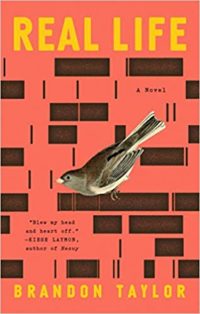 Real Life by Brandon Taylor
Real Life by Brandon Taylor
This recent novel that follows a group of graduate students over a weekend involves a dinner party that is by turns devastating, funny, and infuriating. As in Woolf’s novel above, it serves the purpose of bringing together a group of characters about midway through the novel. In this case, the central point of the dinner occurs when one of the guests makes blatantly racist remarks towards the main character, Wallace. This incident doesn’t end or even exactly begin with these remarks, but instead rises naturally out of the tone of the party and the racial makeup of the room, then setting the stage for the rest of the evening (and, arguably, the rest of the novel).
The dinner is a planned event, but the tension it creates is clearly connected to the spontaneous events that precede and follow it. This setup enables Taylor to show not only the racism embedded in the environment Wallace inhabits, but the expectations all of the characters have brought to the gathering and the lasting effects their actions have on one another. CW: Racism, sexual assault and abuse
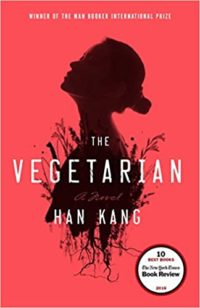 The Vegetarian by Han Kang (Translated from the Korean by Deborah Smith)
The Vegetarian by Han Kang (Translated from the Korean by Deborah Smith)
Han Kang’s The Vegetarian, which was awarded the 2016 Man Booker International Prize, is about a woman, Yeong-hye, who stops eating meat and begins eating less and less altogether. In doing so, she disrupts the lives of those around her. In the first third of the book, her husband describes her behavior during a dinner at a restaurant with his work superiors that she attends with him. At the dinner, she refuses to partake of the majority of dishes, but this in itself isn’t what seems to bother her husband. He appears mostly horrified that she isn’t wearing a bra and also that she refuses to explain her vegetarianism in a socially acceptable way, instead simply stating that she doesn’t eat meat and leaving everyone else to flail around on the subject.
This scene is important because it emphasizes that Yeong-hye’s husband doesn’t specifically object to her vegetarianism (or as fans of r/relationships might say, “The Iranian yogurt is not the issue here”), but rather to her ability to remain self-contained and resolved in her decision without needing to seek approval from others or adhere to social niceties. CW: sexism/misogyny, eating disorders, sexual assault and abuse, animal abuse
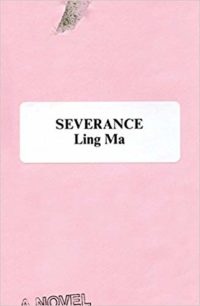 Severance by Ling Ma
Severance by Ling Ma
This novel is about the apocalypse, but much of the story is made up of flashbacks in the life of Candace, the main character. One of the events in these flashbacks that seems to hold the most significance is a dinner party that Candace arranges with her roommate, Jane, after having received some items that belonged to her deceased mother in the mail. Among these items are some dried shark fins, which Jane wants to use to make shark fin soup for an ’80s dinner party. Candace invites someone to this event she was previously casually sleeping with, a recently divorced man named Steven, who during the course of the party offers her a lead for a job. But when dinner is about to begin, she finds herself climbing down the fire escape to smoke a cigarette with her downstairs neighbor, Jonathan, who we know will eventually become her long-term boyfriend; in this timeline, however, the two of them have only just met.
During this dinner, elements of the past and the future converge in Candace’s life—from her mother’s mysterious shark fins (which seem to be wasted, as the soup doesn’t turn out very well), to a budding relationship and a new job. These elements mix in a way that is enhanced by the presence of a planned social gathering, with loose rules to be followed or flouted according to whim.
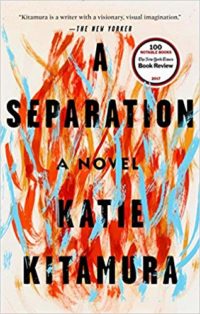 A Separation by Katie Kitamura
A Separation by Katie Kitamura
In Katie Kitamura’s literary suspense novel A Separation, the unnamed narrator takes part in what should objectively be one of the worst meals imaginable when she dines with the mistress of her missing husband, who she intends to divorce. Maria, who happens to be an employee at the hotel where the narrator is staying and where her husband stayed before her, simply strolls into the hotel restaurant and asks if she can join the narrator. After being offered a glass of wine, Maria waits until the narrator offers her dinner, and then proceeds to order herself an expensive meal (lobster, steak, etc.) while telling the story of how she met the narrator’s husband, Christopher. In the meantime, the narrator reflects impassively on her marriage and tries to visualize how the affair between Maria and Christopher might have unfolded.
The tone of the scene is strange, but it matches the strangeness of the overall narrative, in which the narrator gives many opinions about others while revealing more and more about herself.
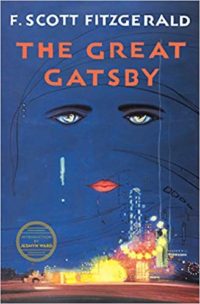 The Great Gatsby by F. Scott Fitzgerald
The Great Gatsby by F. Scott Fitzgerald
Those who are familiar with The Great Gatsby or any of its adaptations may most immediately associate it with Gatsby and his raucous parties—the people, the drinks, the music. But there’s a brief scene early on in the book—where the main character, Nick, goes to visit his cousin Daisy and her husband Tom—that is arguably just as out of control as any of the revelry at Gatsby’s. For one thing, we quickly find out that Tom is a horrible racist who can’t shut up about how racist he is. We also find out that he’s physically abusive towards Daisy, which comes out when Daisy casually shows everyone at the table a bruise he gave her. That the dinner goes by quickly only adds to the hand-in-hand horror and realism of the scene: Everyone is held captive by social conventions along with the basic need to eat, and so simply listens to the terrible truths being voiced before letting them be cleared away with the dishes. CW: Racism, sexism/misogyny
 My Heart Hemmed In by Marie NDiaye (Translated from the French by Jordan Stump)
My Heart Hemmed In by Marie NDiaye (Translated from the French by Jordan Stump)
My Heart Hemmed In follows the plight of Nadia who, along with her husband Ange, has inexplicably become an outcast in her own community. Ange has also somehow been physically wounded in a way that, along with everything else in the story, defies clear or simple explanation. As Nadia and Ange try to understand what they have done to deserve their situation, they find themselves unwillingly dependent on an imposing neighbor, Monsieur Noget, who insists on cooking all their meals for them.
This leads to many dinners that are ostensibly delicious but, in the context of their forced nature and other unappetizing factors, seem kind of gross. At one point, Noget informs Nadia that he has made ossobuco, then goes on to say how he sources his meat from a cousin who has a “top-grade farm” and how the marrow is what makes the dish fatty, and isn’t Ange very fond of marrow? Having someone cooking dinner for you in your own home without your consent is really a rather creepy situation when you think about it, and Noget’s actions here are effectively disturbing.
Dinner is hopefully more often than not a pleasant, uneventful experience. But it’s also a perfect setting for some effectively messed up (and alternately beautiful) scenes in literature. So enjoy your dinners and enjoy your fiction, but proceed with caution.
Source : 7 of the Best and Worst Dinners and Dinner Parties in Fiction










